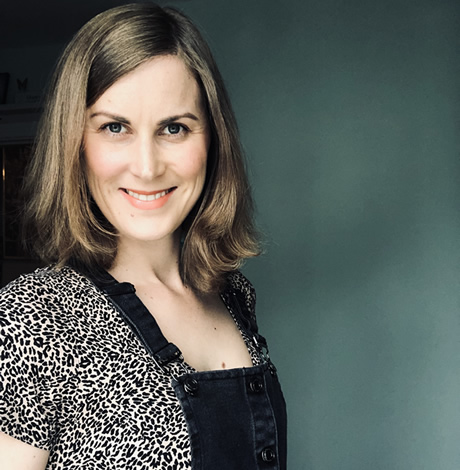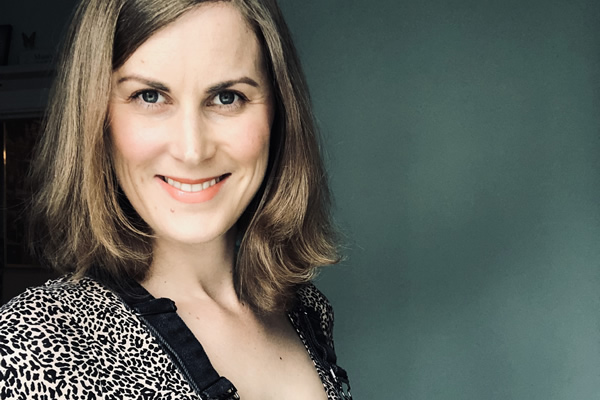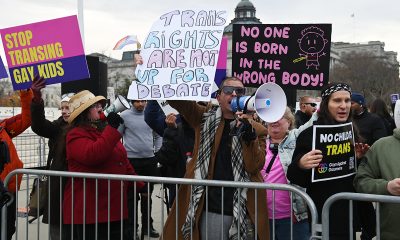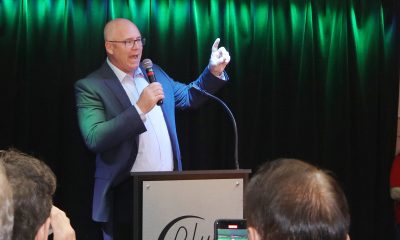Opinions
Still fighting for parental rights in Ireland
Every child of an LGBTQ parent deserves equality under the law


My name is Ranae and I live in Dublin, Ireland with my wife Audrey. Our daughters Ava and Arya are 4 and 2. Our girls have two mothers, yet I am still seen as a single parent.
Audrey and I were an unlikely couple from the start. She was in her fourth and I was in my first year of acting in a theater school in Dublin. We were paired together at an open day and became friends. We were so different, yet we immediately clicked. I knew Audrey wasn’t straight, but over the course of the next year, I had no idea that I was developing feelings for her. The day before my 21st birthday the realization hit me like a bolt of lightning. The feelings I had for her were so much more than just friendship. The rest, as they say, is history.
We have been together for 12 years now, and married for five. Audrey and I always knew we wanted to have kids and talked about this from the moment we started dating. We both have lots of siblings and knew that life wouldn’t be complete for us without having our own kids. I always dreamed about being pregnant and going through the process of growing and birthing a baby. Audrey, on the other hand, didn’t really want to be pregnant as long as she could become a parent. It was almost an unspoken thing that I would be the one to carry our child, should we go down the IVF route.
One night in early 2015, after a few glasses of wine, I had an idea. Wouldn’t it be cool if we could use Audrey’s eggs but I would carry the baby? This way, our children would genetically be Audreys, but I would be the birth mother. At the time it was just a silly idea we had. Little did we know that conversation would change the course of our lives. We decided to Google it and lo and behold, we found out that it wasn’t that crazy of an idea. Reciprocal IVF was actually an incredibly popular fertility treatment option for same-sex couples. At that moment, we knew that Reciprocal IVF was right for us.
When we tried to book a clinic appointment in Dublin, we were disappointed to find out that they wouldn’t treat us in Ireland. Back in 2015, Reciprocal IVF wasn’t licensed yet. In fact it’s only been licensed in the last year. We were given the option to do IUI/IVF with my own eggs, but at that point we had our hearts set on using Audrey’s eggs. Despite the setback, it made us more determined to find a way. We found a clinic in Spain and to be honest it was a bit of a crazy time for us. We didn’t know any other LGBTQ+ parents, let alone any who had undergone treatment abroad. We had no clue what we were doing, and made so many mistakes along the way. A few months later, we conceived our first child with the help of an anonymous sperm donor.
Conceiving our first child in the wake of marriage equality in Ireland was like a dream. Wrapped up in our little bubble of happiness, we went through that pregnancy with a sense of hope for our future. We got married when I was five months along and we celebrated a future that was finally equal. Little did we know what lay ahead of us.
Toward the end of my pregnancy, we learned something that devastated us. LGBTQ+ parents in Ireland were still not equal. I remember feeling so overwhelmed with emotions and going through various stages of shock. My first reaction was ‘but we are married and we voted for marriage equality last year.’
After consulting with a solicitor, we found out more. From the moment our daughter was born I would be a married woman but considered a single mother. I would be forced to register myself as a sole parent and our family would not be recognized under the law, simply because we were a same-sex couple. The simple difference was that I was married to a woman and not a man and because of this, Audrey would be a legal stranger to her own child.
There are some moments that stick with me. Moments that were stolen from us as a young family and ones that we will never get back. The day we registered Ava’s birth, we walked into the registration office and saw all the proud parents with their babies. When they called us into the room, the registrar sat down behind her desk. Without looking up she asked, ‘OK, so which one of you is the mother?’ We said, ‘We both are.’ ‘But which one of you gave birth?’ I said, ‘I did!’ She looked at me and said, ‘OK Ranae, I will be directing all my questions at you, if that’s OK?’ From that point on, she didn’t even look at Audrey. It felt like a kick in the gut. It was just all wrong.
That was the day I promised Audrey I was never going to stop fighting until we fixed this. I joked and said, well at least this will all be sorted out by the time we have another baby. How wrong I was. Fast forward to New Year’s Eve 2018 and I lie bleeding in the recovery suite with a second daughter, listening to fireworks, my heart breaking because I knew we were still in the same position as before. As it stands today, I am considered a single parent to our daughters. Our children, along with countless others in Ireland, are denied the right to a legal connection with both of their parents simply because their parents are a same-sex couple.
Much has changed in the last five years. In 2019, following on from an online petition that I started, we started a campaign called ‘Equality For Children’ along with a group of other LGBTQ+ parents. Since then we have been successful at lobbying the government for change and raising awareness of these issues within Ireland. Legislation was finally passed in 2020 that would allow certain LGBTQ+ families to have both parents legally recognized. Sadly it’s legislation that will only cover certain methods of conception. It’s great to see progress in the right direction, but it’s galling for anyone who falls outside of this and is still being actively discriminated against. Only female couples who have conceived in an Irish clinic with a non anonymous donor and a child born in Ireland are covered.
I can’t really put into words how damaging this has been for our family. To be reminded every day that you are ‘less than.’ That you are not equal. For your kids to be punished because their parents aren’t straight. In practical terms it’s an issue for children when one of their parents is unable to give medical consent, unable to travel freely with them, unable to make decisions on their behalf. But it goes beyond that, the emotional and physiological damage it has done to our families is immeasurable.
Following on from lengthy legal proceedings, our family soon hopes to be recognized. If we are, we will be one of the lucky ones. What about all those who fall outside of this? Are their children less deserving of equality? Because they have two dads? Because they were conceived outside of a clinic? Because they have a known donor? Because they weren’t born in Ireland?
This fight will never be over until every child of an LGBTQ+ parent in Ireland has the same rights and protections as any other child in the country.
Ranae von Meding is a writer and a same-sex parent to two young daughters with her wife Audrey. They live in Dublin, Ireland where she has become an outspoken advocate for equal rights for children of LGBTQ+ families. She is the co-founder and CEO of ‘Equality For Children.’ You can find her on Instagram at @ranaevonmeding.
Opinions
Community comes together to repair WorldPride history exhibition
Vandals damaged pictures, timeline walls on June 22

Earlier this month, vandals shouting homophobic slurs damaged the 8-foot hero cubes and timeline walls of the Rainbow History Project’s (RHP) WorldPride exhibition “Pickets, Protests, and Parades: The History of Gay Pride in Washington.” The week’s incident was the fifth homophobic attack on the exhibition chronicling DC’s LGBTQ+ History, the vandalism damage was only made worse by the storms this past week.
In response, RHP posted a call online for volunteers and donations and over a dozen volunteers showed up on Saturday to repair the exhibition in its final stretch.
It took three hours, but the group assembled during a heat advisory to bend the fences back into place, fix the cubes and zip tie all the materials together to keep them safe. Some of those who came out to volunteer, Slatt said, were known RHP volunteers but most were total strangers who had attended an event here or there or just wanted to get involved for the first time, one was even in D.C. as an out-of-town guest and after seeing the Instagram call, decided to spend their day lifting some heavy fencing back into place.
When asked why they showed up, volunteer Abbey said: “especially during Pride month, it’s so important to come together as a community, not just to celebrate, but to support each other. To know that this historic exhibit is even able to exist right now under this administration is really amazing. The fact that we’re just able to help continue it in its last leg of being out here is really important.”
“Rainbow History Project does a lot of work for the community,” another volunteer Ellie said, “they show up in a lot of ways that I think we really need right now, so in terms of being asked to come out and do a couple hours of lifting, that is something that we can easily support and do.”
“We put out a call asking for support from the community, and so we didn’t know what we’d get,” Slatt continued, “but strangers have shown up. We were upset, we were crying. We were trying to come up with a battle plan and more and more people have shown up with open arms and empty hands to do this. It’s 95 degrees, we are melting in the heat. It’s just amazing the number of people who have come here.”
If anything, the anonymous exhibit designer said, the people who vandalized the exhibit made the community stronger and mobilized members passionate about preserving and sharing our histories. Their efforts backfired in a big way — bringing together people who had only attended one or two RHP events or had read about the organization online to actively contribute to the work.
It’s a meaningful representation of the history of D.C.’s LGBTQ+ community, one that often starts with a small group of people who come together to protest but soon mobilize their communities and enact monumental change in the nation’s capital.
“If Pride in D.C. started with 10 people picketing the White House,” Slatt remarked, “you just got 12 more to join the gay history movement.”
This was especially poignant, another volunteer Mattie said, on the week that the Supreme Court issued a decision allowing Tennessee to ban puberty blockers and hormone therapy for minors seeking gender affirming care. It was a devastating moment for the LGBTQ+ community who mobilized once more in front of the Supreme Court this past Friday.
“It’s been actually really important to see this community come together in the face of direct attack on our history in the wake of direct attacks on our rights,” Mattie said, “and we stand up to that. We come together, and we represent. That is so important to maintaining our strength and our community throughout trying times now and ahead.”
When asked about how community members can support RHP’s work and repair the damage long-term to the exhibit, Slatt urged people to donate to RHP, to volunteer as exhibit monitors, and to come visit the exhibit.
“We’ve been doing this for 25 years. This is our 25th anniversary, and if it weren’t for volunteers donating their time and their talents, if it weren’t for small dollar donors, we would never have gotten anything done,” Slatt said. “I’d say to anyone out there that we are on this plaza all through Independence weekend, we are here through the Smithsonian Folklife Festival, people can come on down.”
Slatt and other volunteers will be leading tours each evening at 7 p.m. at Freedom Plaza, and people can pre-order the exhibition catalog right now, which will be delivered in time for LGBTQ+ History Month in October.
Emma Cieslik is a D.C.-based museum worker and public historian.

Independence Day, commonly known as the Fourth of July, is a federal holiday commemorating the ratification of the Declaration of Independence by the Second Continental Congress on July 4, 1776, establishing the United States of America. The delegates of the Second Continental Congress declared the 13 colonies are no longer subject (and subordinate) to the monarch of Britain, King George III and were now united, free, and independent states. The Congress voted to approve independence by passing the Lee resolution on July 2, and adopted the Declaration of Independence two days later, on July 4.
Today we have a felon in the White House, who wants to be a king, and doesn’t know what the Declaration of Independence means. Each day we see more erosion of what our country has fought to stand for over the years. We began with a country run by white men, where slavery was accepted, and where women weren’t included in our constitution, or allowed to vote. We have come far, and next year will celebrate 250 years. Slowly, but surely, we have moved forward. That is until Nov. 5, 2024, when the nation elected the felon who now sits in the Oval Office.
There are some who say they didn’t know what he would do when they voted for him. They are the ones who were either fooled, believing his lies, or just weren’t smart enough to read the blueprint which laid out what he would do, Project 2025. It is there for everyone to see. There should be no surprise at what he is doing to the country, and the world. Last Friday his Supreme Court, and yes, it is his, the three people he had confirmed in his first term, gave him permission to be the king he wants to be. The kind of king our Declaration of Independence said we were renouncing. A man who with the stroke of a pen can ruin thousands of lives, and change the course of America’s future. A man who has set back our country by decades, in just a few months.
So, I understand why many are suggesting there is nothing to celebrate this Fourth of July. How do we have parties, and fireworks, celebrating the 249th year of our independence when so many are being sidelined and harmed by the felon and his MAGA sycophants in the Congress, and on the Supreme Court. Yes, there are those celebrating all he is doing. Those who want to pretend transgender people don’t exist, and put their lives in danger; those who think it’s alright to take away a women’s right to control her body, and her healthcare; those who think parents should be able to interfere on a daily basis with their children’s schooling and wipe out the existence of gay people for them. Those who pretend there was a mandate in the last election, when it was only won by about 1 percent. Those who think disparaging veterans, firing them, and taking away their healthcare, is ok. Those in the LGBTQ community like Log Cabin Republicans, who think supporting a racist, sexist, homophobe is the right thing to do.
So, what do we, as decent caring people, do this Fourth of July. What do we say to those who are being harmed as we celebrate. What do we say to those trans people, those women, those immigrants who came here to escape their own dictators, and are now finding they have come to a country with its own would-be dictator. I say to them, please don’t give up on America. Don’t give up on the possibility decent loving people in our country will finally wake up and say, “enough.” That the majority of Americans will remember we fought a revolution to escape a king, and we fought a civil war to end slavery. That we moved forward and gave women the right to vote, and gave the LGBTQ community the right to marry. Don’t give up on the people that did all that, and think they won’t rise up again, and tell the felon, racist, homophobe, misogynist, found liable for sexual assault, now in the White House, and his sycophants in congress, and his cult, that we will take back our country in the 2026 midterm elections. That we will vote in large numbers, and demand our freedom from the tyranny that he is foisting on our country.
So yes, I will celebrate this Fourth of July not for what is happening in our country today, but rather for what our country actually stands for. Not for birthday parades, and abandonment of the heroes in Ukraine in support of dictators like Putin. But for the belief the decent people in our country will rise up and vote. That is what I will celebrate and pray for this Fourth of July. That is what I think the fireworks will mean this July Fourth. I refuse to accept defeat the same way our revolutionary soldiers wouldn’t, and the way our troops in the civil war wouldn’t till the confederacy was defeated.
I will celebrate this Fourth of July because I refuse to accept we will not defeat those who would destroy our beautiful country, and what it really stands for.
Peter Rosenstein is a longtime LGBTQ rights and Democratic Party activist.
Opinions
Is it time for DC to have new congressional representation?
Del. Eleanor Holmes Norton will turn 89 in June

With WorldPride, Supreme Court decisions, military parades in our streets, mayor and City Council discussions about a new football stadium, it is entirely understandable if we missed the real local political story for our future in the halls of Congress. Starting this past May, the whispered longtime discussions about the city’s representation in Congress broke out. Stories in Mother Jones, Reddit, Politico, Axios, NBC News, the New York Times, and even the Washington Post have raised the question of time for a change after so many years. A little background for those who may not be longtime residents is definitely necessary.
Since the passage of the 1973 District of Columbia Home Rule Act, we District residents have had only two people represent us in Congress, Walter Fauntroy and Eleanor Holmes Norton, who was first elected in 1990 after Mr. Fauntroy decided to run for mayor of our nation’s capital city.
No one can deny Mrs. Norton’s love and devotion for the District. Without the right to vote for legislation except in committee, she has labored hard and often times very loud to protect us from congressional interference and has successfully passed District of Columbia statehood twice in the House of Representatives, only to see the efforts fail in the U.S. Senate where our representation is nonexistent.
However, the question must be asked: Is it time for a new person to accept the challenges of working with fellow Democrats and even with Republicans who look for any opportunity to harm our city? Let us remember that the GOP House stripped away millions of OUR dollars from the D.C. budget, trashed needle exchange programs, attacked reproductive freedoms, interfered with our gun laws at a moment’s notice, and recently have even proposed returning the District to Maryland, which does not want us, or simply abolishing the mayor and City Council and returning to the old days of three commissioners or the very silly proposal to change the name of our Metro system to honor you know you.
Mrs. Norton will be 89 years old next year around the time of the June 2026 primary and advising us she is running for another two-year term. Besides her position there will be other major elected city positions to vote for, namely mayor, several City Council members and Board of Education, the district attorney and the ANC. Voting for a change must not be taken as an insult to her. It should be raised and praised as an immense thank you from our LGBTQ+ community to Mrs. Norton for her many years of service not only as our voice in Congress but must include her chairing the Equal Employment Opportunity Commission, her time at the ACLU, teaching constitutional law at Georgetown University Law School, and her role in the 1963 March on Washington.
Personally, I am hoping she will accept all the accolades which will come her way. Her service can continue by becoming the mentor/tutor to her replacement. It is time!
John Klenert is a longtime D.C. resident and member of the DC Vote and LGBTQ+ Victory Fund Campaign boards of directors.
-

 U.S. Supreme Court3 days ago
U.S. Supreme Court3 days agoSupreme Court to consider bans on trans athletes in school sports
-

 Out & About3 days ago
Out & About3 days agoCelebrate the Fourth of July the gay way!
-

 Virginia3 days ago
Virginia3 days agoVa. court allows conversion therapy despite law banning it
-

 Federal Government5 days ago
Federal Government5 days agoUPenn erases Lia Thomas’s records as part of settlement with White House












